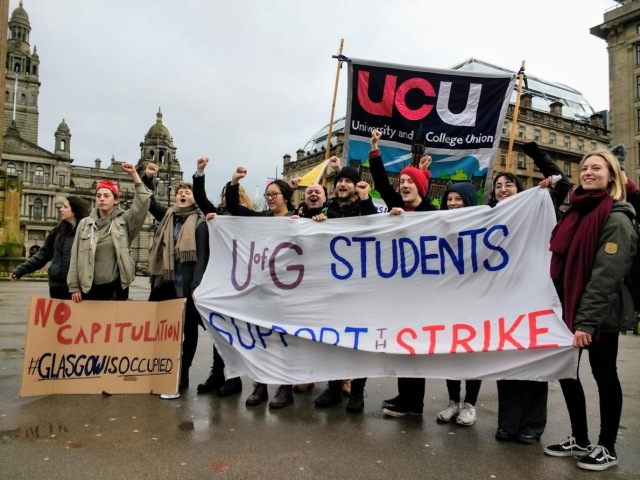9 Things I learned Striking…

1. The importance of the strike itself—as a tactic, a tool, a space, for challenging conditions of precarity. As someone that’s relatively early career (I’ve been a lecturer for 5 years), a strike was something I’d read about but didn’t think I’d ever perform. In doing so, I confronted myself as a worker amongst workers. And realized the long-held power of withheld labour.
Even amongst the most privileged of us, it was important to strike. To actively disavow the strike, in the name of complacency, comfort, or embarrassment, only undermines the potency—and visibility—of striking from the toolkit of progressive politics.
2. The importance of the picket line. Lots of you will have felt joy, anger, sadness, happiness, and the biting arctic cold, at the picket line. But this space was the frontline of the strike, what Hannah Arendt might call a space of appearance. I didn’t appreciated, ahead of time, how important it was to have bodies on the street. But it did. Bodies of all shapes and sizes. Abilities and ages. Bodies whose very presence articulated—and signified—a demand. A call. The picket line was a lively, affective space of difference and demand—where our appearance itself was both a signifier and a corporeal power. Where bodies affected and impressed themselves in and against the flesh of the world.
For many of us the picket was a transformative space.
3. We found each other. We found students and colleagues that existed but did not appear to us. It’s easy to become alienated in our offices—lost at our keyboards, lost in conferences, lost in bureaucracy. But on the street, we found each other. We found new friends. We forged new assemblies that cut across hierarchies, disciplines, and entrenched daily routines. Bubbles were burst.
4. The strike expanded beyond a pension dispute. It lifted the lid on an ugly can of worms. Obscene VC pay. Authoritarian mangers. Deadening and overwhelming work routines. Gender disparities. Mental health crises. It became a lightning rod against the marketization of everything: pensions, universities, students, futures, bodies, minds.
5. Social media solidarity. Twitter was vital in sending messages of support and solidarity, coordinating action, and synchronizing student occupations. And I learned so much about the pension dispute through this medium—and with the release of USSBriefs it became a vital beacon for educating ourselves.
6. Education beyond the syllabus. Teach-ins and teach-outs were inspiring and beautiful. We learnt that education is, was, and always will be, bigger than university.
7. The importance of connecting to people beyond the university. This one is particularly important to me. Glasgow members gave blood at a local NHS donation centre. And many of us strikers went to volunteer at local foodbanks (and subsequently signed up afterwards). The strike reaffirmed how our little lives are always folded into a larger life. The life of the world.
8. Student-staff solidarity. The support from our students was the lifeblood of the strike and enabled us to keep going for 4 weeks. Student occupations affirmed who the university was for, and whose futures depending on it. Not managers. Not VCs. Not overpaid security staff. But students. It’s their house. And we are lucky to be a part of shaping their future.
9. Legacy: social spaces. There’s an opportunity to build upon our momentum to create a union that is a progressive, creative, anti-marketization space for student-worker solidarity. One suggestion is a UCU social space that meets regularly in campuses across the UK—to break bread, laugh, joke, and hold an always fragile assembly together. At Glasgow, we’ve started just that—with weekly lunchtime meetings.
—
I want to finish by reading out a statement from two Glasgow undergraduate students–David Hanson and Agnes Berner. They wanted me to read it out, on behalf of Glasgow University Strike Solidarity
We came together from a wide range of backgrounds: marxists, anarchists, feminists, faith organisations, activists involved with tenants’ rights, human rights, environmental and LGBT+ issues; some had been politically involved for years, and some had zero experience. One word tied us together: Solidarity. We recognised that although this was not about our pensions, the strike was a part of our struggle. As the strike progressed, the picket lines became not only a physical space, but an intellectual space rarely seen at the university. The strike was an opportunity to develop relationships with our lecturers outside the confines of the classroom. At heart, students and staff want the same thing: an open, democratic, and fair university that puts people ahead of profits.
It also made us look to our fellow students across the UK. We inspired, taught and encouraged each other. Social media made our actions visible and connected us despite being hundreds of miles apart. As more universities were occupied, the more it strengthened our resolve. The last week of the strike had seen an unacceptable proposal by UUK. As students, we knew our presence and outreach had been appreciated by the strikers, but senior management continued to avoid their responsibilities to students and staff. We had to make a show of force to demonstrate that the end of the strike was not the end of our fight: so we decided to occupy.
Occupations were orchestrated by very few people at some 20 universities. But by acting simultaneously and in unity, we had strong visible impact on fellow students, staff, and management, ultimately creating enough disruption to reach the media. As politicians started to reach out and respond, we realised the efficacy of our actions and how we could push for changes beyond the scope of the pensions dispute.
The fight against the marketisation of higher education and the neoliberal agenda that are eroding our universities begins now.
